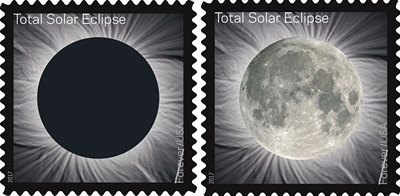CTI Inks Illuminate August 2017 Solar Eclipse
- Published: June 22, 2017
COLORADO SPRINGS, CO | Normally a thumb is used to affix a postage stamp to an envelope. However, with the new postage stamp unveiled by the US Postal Service (USPS) commemorating a solar eclipse, a thumb or finger does double-duty in transforming to/from an image of the moon crossing the sun’s path. The stamp marks the occasion of the August 21, 2017, solar eclipse during its 90-minute journey across the US from Oregon to South Carolina.
The last time a solar eclipse was visible in the US was 1979. And it was 99 years ago that the area of totality stretched across the entire US.

Clearly such a special occasion warranted an equally special stamp, and Chromatic Technologies Inc. (CTI) rose to the occasion. The unique thermochromic (temperature-activated, color-changing) inks of CTI allow a single stamp to display two images of the sun’s corona during a total solar eclipse (dark). When a thumb or finger at 84 deg F or higher is placed on the stamp for a few seconds, the lunar surface appears. The lunar surface image reverts to its original dark image when cooled to 77 deg F and below. Room or outdoor temperatures of 84 deg F or higher will also activate the stamp’s unique image capabilities.
The stamps will change indefinitely between the two images when heat is applied. Since thermochromic inks are susceptible to UV light and should be kept out of direct sunlight to preserve this special effect, a special envelope to hold and protect the stamp pane is being offered by the USPS for a nominal fee.
Stamp collecting traces its origins back to the 1840s. Today’s philatelists can take comfort knowing their prized stamp collections with the first-ever thermochromic stamps will retain their "magic" for generations of collectors’ families.
The innovative technology from CTI is the same process that major worldwide brands such as MolsonCoors, Frito-Lay, and Coca-Cola have used since CTI’s start in 1993. The thermochromic inks are uniquely formulated for use in screen printing, but CTI has the same technology for use in flexographic, gravure, and offset printing processes. The thermochromic inks are available in multiple colors (and at various activation temperatures) and also can be adapted to change color when exposed to sunlight (photochromic inks).
Similar thermochromic inks have been used successfully on metal beverage cans, glass, and plastic bottle labels, folding cartons, and flexible packaging.




